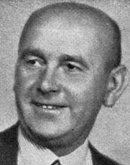

Jindřich Freiwald
*6. 6. 1890 – Hronov, Czech Republic
†8. 5. 1945 – Prague, Czech Republic
Biography
He came from a well-known family in Hronov related to the writer Alois Jirásek. After graduating from the higher technical school of construction in Prague (1910), he worked as an assistant to Antonín Balšánek, who invited him to collaborate on the interiors of the Municipal House in Prague and the Vršovice savings bank. From 1913, he studied at the Academy of Fine Arts in Prague under Jan Kotěra. In 1921, he co-founded the design and construction firm Freiwald & Böhm in Prague-Karlín with Jaroslav Böhm, where he worked until the end of his life. The creative authorship of jointly signed projects clearly belonged to him. He was a member of SVU Myslbek, SIA, the Czech Technical Academy, and chairman of the Association of Builders in Prague. He began publishing his first works in the style of geometric modernism as early as 1912 in the Construction Papers. After World War I, he embraced inspirations from Cubism and Rondocubism and later moved towards Purism and Functionalism.
In his design work, he focused primarily on housing issues. Between the world wars, he was the author of several villas and colonies of residential houses in the Czech lands, as well as in Slovakia and Subcarpathian Rus (Uzhhorod and Khust). A classicizing approach, emphasis on materials, and the application of sculptural details became typical for his buildings, which predisposed him to design official and bank buildings or cultural objects, mainly theaters. He also developed competition building plans for the state opera in Tehran (Iran).
He was shot as a parliamentary member of the insurgents during the Prague Uprising in Prague-Krč (memorial near Vídeňská street). He was buried in the legionary cemetery in Hronov.
He came from a well-known family in Hronov related to the writer Alois Jirásek. After graduating from the higher technical school of construction in Prague (1910), he worked as an assistant to Antonín Balšánek, who invited him to collaborate on the interiors of the Municipal House in Prague and the Vršovice savings bank. From 1913, he studied at the Academy of Fine Arts in Prague under Jan Kotěra. In 1921, he co-founded the design and construction firm Freiwald & Böhm in Prague-Karlín with Jaroslav Böhm, where he worked until the end of his life. The creative authorship of jointly signed projects clearly belonged to him. He was a member of SVU Myslbek, SIA, the Czech Technical Academy, and chairman of the Association of Builders in Prague. He began publishing his first works in the style of geometric modernism as early as 1912 in the Construction Papers. After World War I, he embraced inspirations from Cubism and Rondocubism and later moved towards Purism and Functionalism.
In his design work, he focused primarily on housing issues. Between the world wars, he was the author of several villas and colonies of residential houses in the Czech lands, as well as in Slovakia and Subcarpathian Rus (Uzhhorod and Khust). A classicizing approach, emphasis on materials, and the application of sculptural details became typical for his buildings, which predisposed him to design official and bank buildings or cultural objects, mainly theaters. He also developed competition building plans for the state opera in Tehran (Iran).
He was shot as a parliamentary member of the insurgents during the Prague Uprising in Prague-Krč (memorial near Vídeňská street). He was buried in the legionary cemetery in Hronov.
The English translation is powered by AI tool. Switch to Czech to view the original text source.
Realization
Residential buildings on Na Hradbách street in Kolín, 1921–23
Residential buildings on Havlíčkova street in Pardubice, 1922–23
Post office in Nové Město nad Metují, 1928–29
Hus Congregation in Nové Město nad Metují, 1932–34
Town Hall in Jaroměřice nad Rokytnou, 1933
Town Hall in Sobotka, 1935
Theater in Hronov, 1928–1930
Theater in Chrudim, 1931–1934
Theater in Kolín, 1933–1934
Savings Bank in Úpice, 1933
Savings Bank in Mělník, 1934
Savings Bank in Železný Brod, 1936
Residential buildings on Na Hradbách street in Kolín, 1921–23
Residential buildings on Havlíčkova street in Pardubice, 1922–23
Post office in Nové Město nad Metují, 1928–29
Hus Congregation in Nové Město nad Metují, 1932–34
Town Hall in Jaroměřice nad Rokytnou, 1933
Town Hall in Sobotka, 1935
Theater in Hronov, 1928–1930
Theater in Chrudim, 1931–1934
Theater in Kolín, 1933–1934
Savings Bank in Úpice, 1933
Savings Bank in Mělník, 1934
Savings Bank in Železný Brod, 1936











